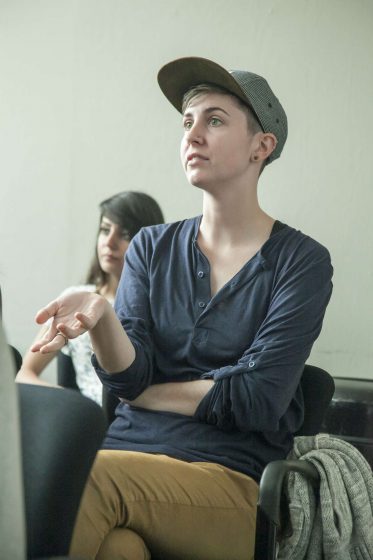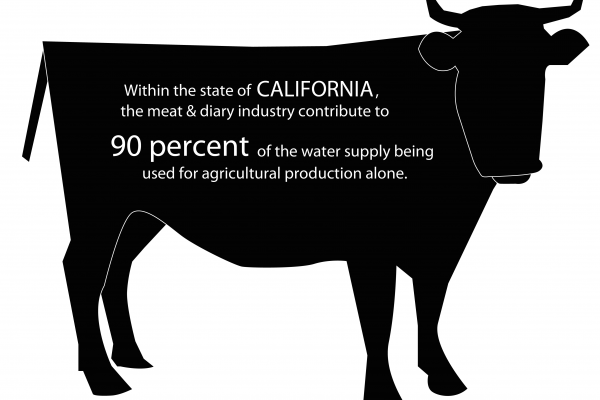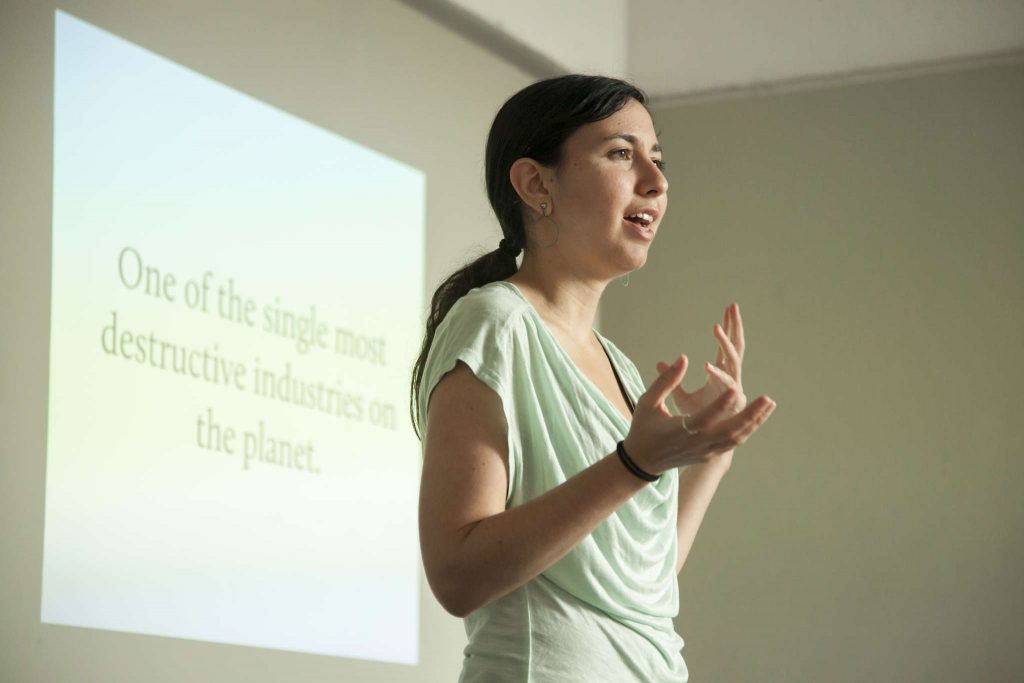
The founder of an Oakland-based nonprofit shook up SF State students today with some surprising statistics about the environmental impact of the factory farming industry and the dietary habits that sustain it.
The Sustainable Initiatives office invited Katie Cantrell from the Factory Farming Awareness Coalition to speak in the student center about the nature of factory farming. To make the whole discussion more palatable for current meat-eaters, Cantrell focused more on the environmental implications than the ethical, according to Liana Derus, manager of Sustainable Initiatives.
“It takes a lot of courage to approach an issue like this,” Derus said. “It’s hard to draw a crowd because most people don’t want to go out of their way to find out why their steak is exacerbating the drought.”
During her presentation, Cantrell provided data to show the large-scale effects of individual dietary choices, especially in terms of water resources.
“Animal agriculture is one of the single most destructive industries on the planet,” Cantrell said.
More than nine billion land animals are raised and killed for human consumption in the United States every year on average, according to figures provided by the Humane Society of the United States.
Raising those animals requires an enormous amount of land and water, Cantrell said. In California, local consumers only use 4 percent of all water supplies, whereas the meat and dairy industry heavily contribute to 90 percent of all water used on agricultural production in the state, according to Water Footprint Network.
“The impacts of our personal water choices are tiny compared to the impact of our food choices,” she said.
Knowing how hard it can be to digest all that information, Cantrell made it a point to interrupt the discussion with short “cuteness breaks” that included photos of baby animals.
“I’m not saying that eating meat is directly going to cause civil wars, but it’s certainly contributing to problems that are destabilizing communities all over the world,” Cantrell said.
Derus, a vegan, said most people don’t fully understand the effects of their individual behavior, especially with complex systems like the factory farming industry. “With more transparency, it’s easier for people to people to make different choices about their diet,” she said.
[media-credit name=”Illustration by Kaitlin Aguilar/Xpress” align=”alignleft” width=”600″] [/media-credit]Heather Russell, a visual communication design major, was vocal during the discussion, mentioning that she was concerned about the impact of big agriculture in her own hometown of Petaluma.
[/media-credit]Heather Russell, a visual communication design major, was vocal during the discussion, mentioning that she was concerned about the impact of big agriculture in her own hometown of Petaluma.
“I think it’s terribly unhealthy for our social and economic environment to have a few, usually-white, male upper-middle class educated people in charge of something like food,” Russell said.
Some of those in attendance admitted to fearing what they’d find out. Ellie Razlenjani, a 19-year-old in the environmental studies department, said she had just become a vegetarian and wanted to get involved.
“I feel like I’ve been in the dark most of my life – somewhat intentionally – I guess because I was afraid to find out what was really happening,” Razlenjani said. “I just want to be less ignorant.”








Liana Derus • Nov 12, 2014 at 11:01 am
Great article! Thanks for covering this event, Tim and Martin!
Bea Elliott • Nov 8, 2014 at 4:42 pm
The meat/dairy/egg industries spends hundreds of millions of dollars lying to the public about their product. But no amount of false propaganda can sanitize meat. The facts are absolutely clear: Eating meat is bad for human health, catastrophic for the environment, and a living nightmare for animals. There’s never been more compelling reasons or a better time to opt for a plant based diet.
Want to create a better world? Eat like you mean it – Go Vegan
Randy Janssen • Nov 8, 2014 at 3:28 am
The national animal rights groups like the HSUS, PETA and the ASPCA have become urban concentrated vegan cults. They raise millions of dollars by pretending to take care of dogs and cats, then spend it on attacks on agriculture and hunting. Local shelters complain about their aggressive fund raising sucking up all the money, so animals go wanting. All three have concocted stories about animal abuse. They have little or no experience with the animals they claim to protect and either misconstrue legitimate animal husbandry or take
isolated instances of animal cruelty and say they are the norm. They oppose hunting and rodeo. Their goal is to stop hunting by
increments, passing laws against individual methods of hunting or shorten hunting seasons. They get away with this
because of the urban population of the US is separated from its food production and large or wild animals. The country has become a
society of small pet owners who view livestock the same as small lap dogs. Primates will have the same rights as humans and eating meat will be outlawed. Their attack on food production is already causing an increase in cost. So unless you want to end up paying $10.00 a doz. for eggs, $20.00 a lb. for bacon $30.00 a lb. for chicken and $50.00 a lb. for beef, don’t support these groups.
Bea Elliott • Nov 8, 2014 at 4:41 pm
I certainly don’t want eggs, bacon or any flesh no matter how “cheap” it is! What I would like however is for the land and resources it takes to make animal products to be used more efficiently so that fresh vegetables and fruits don’t cost a small fortune! If we just removed all the government subsidies that would be a great start at getting plant based foods more affordable.
I don’t view a cow the same as a cat… Nor do I see you the same as me — But we are all on common ground regarding one thing: We all wish to live – Equally we have that one desire. And we all suffer the same. I don’t understand the insistence on harming others when we could live very well without. But then again… There’s always the economic interests and blood money to explain it.
Randy Janssen • Nov 8, 2014 at 11:51 pm
I doubt someone living on $700.00 social security would think a rise in food cost to help the psyche of livestock is OK. It is arrogant to think that the poor or the lower middle class should be punished or have to change their eating habits to make some urban vegans feel better about themselves.